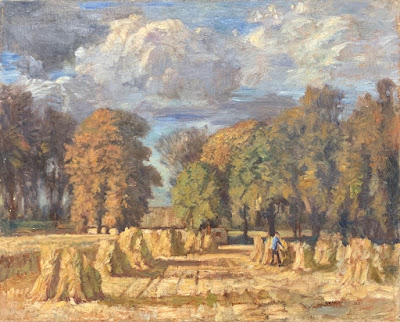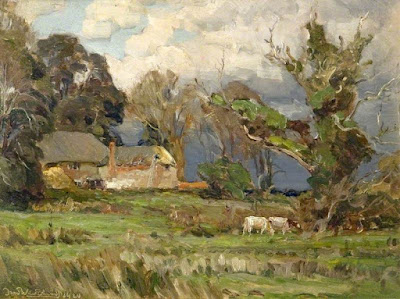One afternoon last week, as I walked along the edge of a grove of pines and maples, I heard a bird's voice up ahead, high in a pine. Not a song or a warble, but two firm, quick calls of the same note, with the sequence repeated three or four times. Then silence. A minute or so later, the two calls were again repeated three or four times, but from another pine, closer this time. The message seemed to be something along the lines of: "I'm here. I'm here." Not an alarm or a warning. Rather, an announcement of sorts (perhaps a greeting?) to any nearby listeners.
I kept walking -- waiting for further calls, and looking up into the trees to see if I could find the source. Then, as I passed beneath the overarching branches of a group of tall bushes, a pileated woodpecker flew down from the left, just ahead of me, and landed on the branch of a bush on my right, at eye level a few yards away. (Please note that I am no expert when it comes to the identification of birds. I knew the name of the bird because I have long had a reliable source: Birds of Discovery Park (prepared by the Seattle Audubon Society and the Seattle parks department), a two-page list of the more than 200 species of birds that inhabit the place where I take most of my walks.)
What a wonderful sight he or she was: a bright red pointed crest on the top of its head, two thin white stripes on its black face, with the stripes continuing down its neck, and a black-feathered body. I see the woodpeckers a few times a year, but nearly always at a distance: tapping away up in a tree, my eyes drawn to them by the hollow drumming. Seldom do I see them close at hand. After pausing a moment on the branch, it flew away into the sunlight and shadow of the grove.
I have recently been revisiting the poetry of Saigyō. A day or so after my encounter with the woodpecker, I came upon a poem (a waka) I hadn't read in quite some time:
Were we sure of seeing
a moon like this
in existences to come,
who would be sorry
to leave this life?
Saigyō (1118-1190) (translated by Burton Watson), in Burton Watson (editor), Saigyō: Poems of a Mountain Home (Columbia University Press 1991), page 158.
These poems we read and love: we carry them within us. They wait patiently. When the time is right, we find them again, or they return to us. Often serendipitously. Saigyō's poem arrived in such a fashion.
A small thing, my encounter with the woodpecker, but of inestimable value. A value best left unspoken, unarticulated. But not to be forgotten. One of those gifts which -- suddenly, unaccountably -- are bestowed upon us by the World.
Christopher Sanders (1905-1991)
"Sunlight Through a Willow Tree at Kew" (c. 1958)
Small things, never to be forgotten. Seven years ago in May, a hundred or so feet away from the spot where I spent a moment with the woodpecker, I came across a dead mole lying on its back beside the same path. In my post of May 23, 2018, I wrote this about the mole: "He or she was a small, dark-brown thing, about eight inches long, its pinkish-white, fleshy front paws open to the sky. It was those tiny, outspread paws that particularly touched me."
I closed the brief post with this poem, which has appeared here on more than one occasion:
A Dead Mole
Strong-shouldered mole,
That so much lived below the ground,
Dug, fought and loved, hunted and fed,
For you to raise a mound
Was as for us to make a hole;
What wonder now that being dead
Your body lies here stout and square
Buried within the blue vault of the air?
Andrew Young, in Edward Lowbury and Alison Young (editors), The Poetical Works of Andrew Young (Secker & Warburg 1985), page 63. The poem was originally published in Speak to the Earth (Jonathan Cape 1939).
I find it hard to believe that it has already been seven years since I shared that short time with the mole. As the saying goes (repeated at more frequent intervals as one ages, in my experience): "It seems like only yesterday . . ." Should I let go of my memory of the mole? Am I being "sentimental"? A fair number of moderns (wise, undeceived, and ironic) are wont to scoff at "sentimentality." This is sufficient to convince me to embrace it further.
What?
What dost thou surely know?
What will the truth remain,
When from the world of men thou go
To the unknown again?
What science -- of what hope?
What heart-loved certitude won
From thought shall then for scope
Be thine -- thy thinking done?
Tis said, that even the wise,
When plucking at the sheet,
Have smiled with swift-darkening eyes,
As if in vision fleet
Of some mere flower, or bird,
Seen in dream, or in childhood's play;
And then, without sign or word,
Have turned from the world away.
Walter de la Mare, The Complete Poems of Walter de la Mare (Faber and Faber 1969), page 290. The poem was originally published in The Fleeting and Other Poems (Constable 1933).
Patrick Symons (1925-1993), "Oak Arch Grey" (1981)
Exchanging glances with a pileated woodpecker. Leaning down to look at a lifeless mole lying open to the huge blue sky. These small things were fated never to be forgotten. But, when it comes to the gifts the World bestows upon us -- its beautiful particulars -- there is no hierarchy. Nothing is quotidian or commonplace if we are attentive and grateful.
The Escape
I believe in the increasing of life; whatever
Leads to the seeing of small trifles . . . . .
Real, beautiful, is good, and an act never
Is worthier than in freeing spirit that stifles
Under ingratitude's weight; nor is anything done
Wiselier than the moving or breaking to sight
Of a thing hidden under by custom; revealed
Fulfilled, used, (sound-fashioned) any way out to delight.
. . . . . . . . . . . . . . . .
Trefoil . . . . hedge sparrow . . . . the stars on the edge of night.
Ivor Gurney (1890-1937), in Ivor Gurney, Selected Poetry (edited by George Walter) (J. M. Dent 1996), page 46. The punctuation, and the ellipses (in lines 2 and 9, and between lines 8 and 9), are as they appear in the original typescript. The poem was not published during Gurney's lifetime.
"Hedge sparrow." Yes, I understand. My afternoon walk takes me along a path that passes through the center of a large meadow of tall wild grass. Nearly every day, sparrows suddenly appear out of the grass ahead of me, and hop and skip away down the path. I've come to think of them as companions, but I suspect they don't regard me as such. Still, I harbor the fancy that they are starting to tolerate my presence. Small things, of inestimable value.
Compare and Contrast
The great thinker died
after forty years of poking about
with his little torch
in the dark forest of ideas,
in the bright glare of perception,
leaving a legacy of fourteen books
to the world
where a hen disappeared
into six acres of tall oats
and sauntered unerringly
to the nest with five eggs in it.
Norman MacCaig, in Ewen McCaig (editor), The Poems of Norman MacCaig (Polygon 2005), page 432.
In the year before his death, Walter de la Mare said to a friend who came to visit him: "My days are getting shorter. But there is more and more magic. More than in all poetry. Everything is increasingly wonderful and beautiful." (Theresa Whistler, Imagination of the Heart: The Life of Walter de la Mare (Duckworth 1993), page 443.)
The world of dew
is the world of dew.
And yet, and yet --
Issa (1763-1827) (translated by Robert Hass), in Robert Hass, The Essential Haiku: Versions of Bashō, Buson, and Issa (The Ecco Press 1994), page 191. R. H. Blyth provides background to Issa's haiku: "This verse has the prescript, 'Losing a beloved child.' . . . He had already lost two or three children when this baby girl died." (R. H. Blyth, Haiku, Volume 3: Summer-Autumn (Hokuseido Press 1952), page 433.)
Robert Ball (1918-2009), "Mrs. Barclay's Pond, Harborne" (1949)





































